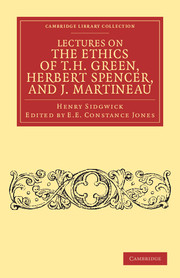
- Publisher:
- Cambridge University Press
- Online publication date:
- November 2012
- Print publication year:
- 2011
- First published in:
- 1902
- Online ISBN:
- 9781139136631
Our systems are now restored following recent technical disruption, and we’re working hard to catch up on publishing. We apologise for the inconvenience caused. Find out more: https://www.cambridge.org/universitypress/about-us/news-and-blogs/cambridge-university-press-publishing-update-following-technical-disruption

One of the most influential of the Victorian philosophers, Henry Sidgwick (1838–1900) also made important contributions to fields such as economics, political theory, and classics. An active champion of higher education for women, he founded Cambridge's Newnham College in 1871. He attended Rugby School and then Trinity College, Cambridge, where he remained his whole career. In 1859 he took up a lectureship in classics, and held this post for ten years. In 1869, he moved to a lectureship in moral philosophy, the subject where he left his greatest mark. Published posthumously in 1902, this work is Sidgwick's expository critique of the leading schools of thought that had emerged to rival his philosophy of utilitarianism, which he had presented previously in his masterpiece The Methods of Ethics (also reissued in this series).
 Loading metrics...
Loading metrics...
* Views captured on Cambridge Core between #date#. This data will be updated every 24 hours.
Usage data cannot currently be displayed.